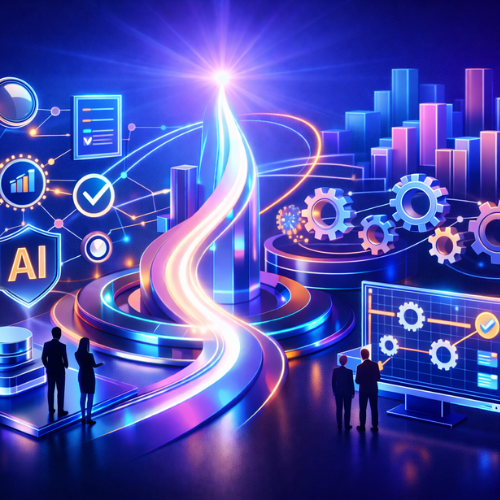Artificial intelligence is already embedded across industries, transforming how we work across key functional roles. From marketing and finance to healthcare and customer service, AI in the workplace is driving real change—enhancing efficiency, automating tasks, and supporting faster, smarter decision-making. Still, many employees struggle to keep up with this rapid evolution, creating skill gaps that hinder their ability to fully leverage AI. According to the World Economic Forum, “Empowering employees with opportunities to reskill will help them better leverage AI tools, helping to drive business value, improve efficiency and shape the future of success.” That’s why AI for business is no longer a future investment; it’s a present-day priority. The question for organizations isn’t whether to embrace AI, but how to align it with strategic goals through targeted solutions like AI for business courses that close the knowledge gap and unlock long-term value.
How AI is Transforming Key Functional Areas
While AI’s applications may vary by industry, the benefits of AI in the workplace are consistent across the board: automation, data-driven insights, and more informed decision-making. These universal advantages are what make AI for business such a powerful tool, regardless of the department or sector. As more companies embrace AI in the workplace, understanding how to harness its full potential becomes a competitive necessity. Below are a few ways for how AI is shaping key functions:

Marketing: AI-Driven Customer Engagement
In marketing, AI in the workplace is driving a new era of personalization. AI is augmenting campaigns by enabling highly tailored customer experiences through smarter segmentation, real-time recommendations, and predictive insights. These are some of the most visible benefits of AI in the workplace, and they highlight why marketers increasingly turn to AI for business courses to stay ahead. With the right AI for business training, teams can unlock new creative strategies and deliver measurable impact across every stage of the customer journey. Companies are using AI-powered tools for:
- Customer Segmentation: AI analyzes vast amounts of data to segment audiences based on behavior, demographics, and preferences.
- Content Personalization: AI-driven recommendation engines ensure customers receive relevant ads, emails, and product suggestions tailored to their interests.
- Chatbots and Virtual Assistants: Automated tools improve customer engagement and support, reducing response times and increasing satisfaction.
Finance: AI-Enhanced Fraud Detection and Risk Analysis:
The finance industry is a clear example of the benefits of AI in the workplace. AI’s ability to process large datasets quickly and accurately enables better fraud detection, smarter risk analysis, and more efficient decision-making. As financial institutions continue to adopt AI for business, there’s a growing need to equip employees with the right knowledge through an AI for business course. This type of targeted training ensures teams can confidently interpret and act on AI-driven insights, improving both performance and trust. Key AI applications in finance include:
- Fraud Detection: Machine learning algorithms detect unusual patterns and flag potentially fraudulent transactions.
- Risk Analysis: AI assesses credit risks and market trends to help financial institutions make data-driven decisions.
- Automated Trading: AI-driven trading bots execute trades at optimal times, maximizing returns and minimizing risks.
Healthcare: AI-Assisted Diagnostics and Medical Data Analysis:
AI is making a significant impact in healthcare, where it’s improving diagnostics and enhancing patient outcomes. This is just one example of the broader benefits of AI in the workplace, as industries begin to adopt intelligent tools that support faster, more accurate decision-making. As part of a comprehensive AI for business strategy, healthcare organizations, and others, can gain lasting value by investing in targeted AI for business courses that prepare teams to use these tools effectively in high-stakes environments. Key applications include:
- Medical Imaging and Diagnostics: AI-powered algorithms analyze X-rays, MRIs, and CT scans to detect diseases such as cancer with higher accuracy.
- Predictive Analytics: AI helps hospitals predict patient admissions, optimize staffing, and reduce wait times.
- Drug Discovery: AI accelerates pharmaceutical research by analyzing chemical compounds and predicting their effectiveness in treating diseases.
Why Role-Specific AI Training Matters
Despite the increasing presence of AI in the workplace, many professionals still lack the skills needed to use AI tools effectively. According to McKinsey, “Nearly half of employees in our survey say they want more formal training and believe it is the best way to boost AI adoption.” This highlights a growing need for AI for business courses that address specific roles and responsibilities. Companies that invest in targeted, function-specific training consistently see improvements in both productivity and efficiency. To stay competitive, businesses must prioritize equipping their teams with the right knowledge, making a well-designed AI for business course an essential step toward sustainable growth and innovation.
Explore Our Custom AI Training Solutions
At Data Society, we specialize in building custom AI training programs designed specifically for your industry and functional roles. Whether you’re in marketing, finance, healthcare, or another sector, our expert-led AI for business courses equip your team with the tools to succeed. We believe that unlocking the benefits of AI in the workplace starts with practical, role-specific training. With the right AI for business course, your employees can confidently apply AI tools, drive smarter decisions, and create lasting business value.
Get in touch today to learn how our AI training solutions can future-proof your workforce and drive innovation within your organization.
Frequently Asked Questions
General training often lacks context for day-to-day tasks. Role-specific training allows teams to learn how AI applies directly to their work—boosting productivity and accelerating adoption. Learn more in our blog on why AI training is no longer just for IT teams.

